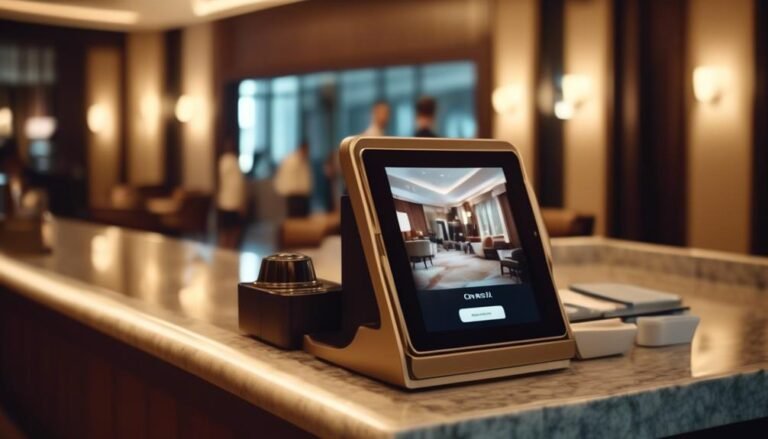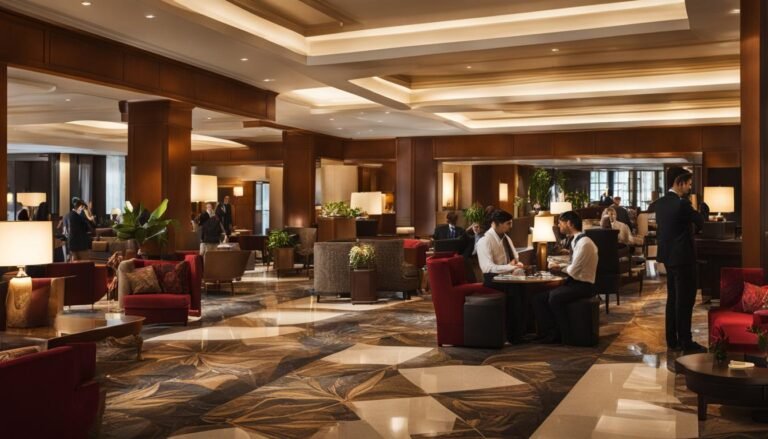Boosting Employee Morale in the Hospitality Industry
In the fast-paced and demanding hospitality industry, maintaining high levels of employee morale is crucial for the success of any establishment. The challenges of long hours, high customer expectations, and intense competition can take a toll on the well-being of hospitality employees.
However, there are proven strategies that can uplift and motivate staff, leading to improved performance, reduced turnover, and enhanced guest satisfaction. By focusing on the specific needs and concerns of hospitality employees, organizations can create an environment where individuals feel valued, supported, and motivated to excel.
Key Takeaways
- Recognition and rewards boost employee motivation and satisfaction.
- Promoting work-life balance is essential for employee well-being and satisfaction.
- Training and development opportunities are a powerful retention tool that fosters a skilled workforce.
- Fostering a positive work environment and open communication encourages trust and collaboration.
Understanding Employee Needs
Understanding the diverse needs and motivations of employees is essential for creating a supportive and productive work environment in the hospitality industry. Employee engagement and job satisfaction are crucial factors that can significantly impact the success of a hospitality business. By understanding the individual needs of employees, hospitality managers can tailor their approach to boost employee engagement and job satisfaction.
Engaged employees are more likely to be productive, loyal, and provide superior service to guests. To achieve this, it’s important for management to create an environment where employees feel valued, respected, and empowered. This can be accomplished through open communication, providing opportunities for growth and development, and recognizing and rewarding outstanding performance.
Job satisfaction is directly linked to employee engagement and is influenced by various factors such as workload, work-life balance, and the overall work environment. Understanding these factors and addressing them can significantly improve job satisfaction among employees. This, in turn, can lead to higher employee morale, lower turnover rates, and ultimately, improved guest satisfaction.
Therefore, understanding and addressing the diverse needs of employees is a strategic imperative for success in the hospitality industry.
Recognition and Rewards
In enhancing employee morale, recognition and rewards play a pivotal role. Implementing initiatives such as Employee of the Month programs, performance bonuses, and personalized thank-you notes can significantly boost employee motivation and satisfaction.
These efforts acknowledge and appreciate the hard work and dedication of hospitality staff, fostering a positive and supportive work environment.
Employee of the Month
Recognizing outstanding employees through the ‘Employee of the Month’ program is an effective way to boost morale and incentivize exceptional performance in the hospitality industry.
This form of recognition serves as a powerful tool for employee motivation, encouraging individuals to strive for excellence in their roles.
The public acknowledgment of an employee’s hard work and dedication not only boosts their morale but also sets a standard for others to aspire to.
By highlighting exemplary behavior and performance, the ‘Employee of the Month’ program reinforces the values and work ethic that contribute to the overall productivity improvement within the organization.
Additionally, the program fosters healthy competition among employees, ultimately leading to a more engaged and motivated workforce.
Furthermore, the rewards associated with this recognition can further inspire employees to consistently deliver their best work.
Performance Bonuses
To recognize exceptional performance and incentivize outstanding contributions, the implementation of performance bonuses is an effective method for fostering employee motivation and engagement within the hospitality industry. Performance bonuses can greatly impact employee morale, productivity, and overall satisfaction, leading to a more positive work environment.
Here are key aspects to consider when implementing performance bonuses:
- Incentive programs: Designing comprehensive incentive programs that align with the organization’s goals and values can encourage employees to strive for excellence in their roles.
- Productivity initiatives: Linking performance bonuses to specific productivity initiatives can motivate employees to achieve targets and contribute to the overall success of the business.
- Performance-based rewards: Offering performance-based rewards reinforces the connection between individual efforts and organizational success, driving motivation and commitment among employees.
Personalized Thank-You Notes
Personalizing thank-you notes for employee recognition and rewards is an impactful strategy for fostering a culture of appreciation and motivation within the hospitality industry. Incorporating a gratitude practice into daily operations can significantly contribute to team building and a positive work environment. A personalized thank-you note communicates genuine appreciation, contributing to an appreciation culture that boosts staff motivation. It is essential to tailor the message to highlight the specific contributions and impact of the individual, evoking a sense of value and recognition.
These personalized notes can go a long way in acknowledging and reinforcing positive behaviors, ultimately strengthening employee morale.
Promoting Work-Life Balance
In today’s fast-paced hospitality industry, promoting work-life balance is essential for employee well-being and satisfaction.
Offering flexible schedules, wellness programs, and encouraging time off are key strategies to support employees in achieving a healthy work-life balance.
Flexible Schedules
Promoting work-life balance through the implementation of flexible schedules is an essential strategy for boosting employee morale in the hospitality industry. To achieve this, consider the following:
- Remote work: Offering the option for employees to work remotely can provide them with the flexibility to manage personal commitments while still contributing to the organization.
- Job sharing: Implementing job sharing arrangements allows employees to divide the responsibilities of a full-time position, enabling them to achieve a better work-life balance.
- Flexible shift scheduling: Providing employees with the ability to choose their shift preferences or allowing for flexible start and end times can accommodate personal obligations and promote a healthier work-life balance.
Wellness Programs
Implementing wellness programs is a proactive approach to fostering a work environment that prioritizes employees’ health and well-being, ultimately contributing to a more balanced and productive workforce. These programs play a crucial role in promoting work-life balance, stress management, and mental health. By offering resources and support for physical and mental well-being, hospitality organizations can help employees manage their stress levels, improve their mental health, and achieve a better work-life balance. This, in turn, leads to increased job satisfaction, reduced absenteeism, and higher productivity. To illustrate the impact of wellness programs, consider the following table:
| Wellness Program Benefits | Employee Impact |
|---|---|
| Stress reduction techniques | Enhanced focus and productivity |
| Mental health resources | Improved morale and job satisfaction |
| Work-life balance initiatives | Reduced absenteeism and turnover |
| Physical health support | Enhanced overall well-being and energy levels |
Time Off Encouragement
By fostering a culture that values time off and work-life balance, hospitality organizations can further bolster their employees’ overall well-being and job satisfaction, building upon the proactive approach of wellness programs.
To encourage a healthy work-life balance and boost morale, hospitality businesses can:
- Offer Generous Paid Vacation: Providing ample paid vacation time allows employees to rest and recharge, reducing burnout and increasing productivity upon their return.
- Promote Mental Health Awareness: Educating employees about mental health and offering resources for support can help reduce stigma and encourage individuals to take the time off they need for their well-being.
- Provide Flexible Time-Off Policies: Implementing flexible time-off policies allows employees to better manage personal and professional commitments, contributing to a more balanced and fulfilling work-life dynamic.
Providing Training and Development Opportunities
To cultivate a culture of continuous improvement and excellence, providing comprehensive training and development opportunities is essential in the hospitality industry. Skill development is a crucial aspect of employee growth, and it directly impacts the quality of service provided to guests. By offering training programs that focus on enhancing specific skills such as customer service, problem-solving, and leadership, employees can become more adept at handling various situations effectively.
Additionally, providing opportunities for career advancement through training can significantly boost employee morale. When employees see a clear path for their professional growth within the organization, they are more motivated to perform at their best and are likely to exhibit higher levels of job satisfaction.
Moreover, training and development initiatives also serve as a powerful retention tool. Employees are more likely to stay with an organization that invests in their growth and provides opportunities for career advancement. This not only reduces turnover costs but also fosters a more skilled and motivated workforce.
Ultimately, by prioritizing training and development opportunities, hospitality businesses can create a work environment that not only attracts top talent but also nurtures and retains it.
Fostering a Positive Work Environment
Creating a positive work environment is crucial for fostering employee satisfaction and productivity in the hospitality industry. To achieve this, hospitality businesses can implement the following strategies:
- Team building: Encouraging team-building activities and exercises can help employees develop strong bonds with their colleagues. This fosters a sense of unity and cooperation, leading to a more positive and collaborative work environment.
- Positive reinforcement: Acknowledging and rewarding employees for their hard work and accomplishments can contribute to a positive work environment. Whether it’s through verbal recognition, incentives, or other forms of appreciation, positive reinforcement can motivate employees and boost morale.
- Open communication: Establishing channels for open and transparent communication is essential for creating a positive work environment. This includes providing avenues for employees to voice their concerns, suggestions, and feedback, as well as ensuring that management actively listens and responds to their input.
Encouraging Open Communication
Transitioning from fostering a positive work environment, an emphasis on open communication is pivotal for nurturing a cohesive and productive hospitality team. Improving feedback and team building are essential components of open communication. By encouraging employees to openly express their thoughts, concerns, and ideas, a culture of trust and transparency is cultivated, leading to increased job satisfaction and morale. This, in turn, fosters a more united and motivated team.
| Benefits of Open Communication | Strategies for Implementation |
|---|---|
| Fosters trust and transparency | Regular team meetings to discuss challenges and successes |
| Encourages collaboration and idea sharing | Anonymous suggestion boxes for employees to share feedback |
| Improves problem-solving and conflict resolution | Implementing an open-door policy for all team members |
Supporting Health and Wellness
Supporting the health and wellness of hospitality employees is essential for ensuring their overall well-being and productivity. In the fast-paced and demanding environment of the hospitality industry, it is crucial to prioritize the mental and physical health of employees.
Here are three key strategies to support health and wellness:
- Mental Health: Providing access to mental health resources such as counseling services or employee assistance programs can offer crucial support for hospitality staff. Additionally, promoting a stigma-free environment where employees feel comfortable discussing mental health concerns is vital.
- Stress Management: Implementing stress management workshops, relaxation techniques, and time management training can help employees effectively cope with the pressures of the industry. Encouraging regular breaks and promoting work-life balance are also effective stress management strategies.
- Health Promotion: Offering wellness initiatives such as gym memberships, healthy food options, and fitness challenges can motivate employees to prioritize their physical health. Providing access to healthcare resources and regular health check-ups can further demonstrate the organization’s commitment to employee well-being.
Conclusion
In conclusion, boosting employee morale in the hospitality industry is crucial for the success of businesses in this sector.
By understanding employee needs, providing recognition and rewards, promoting work-life balance, and offering training and development opportunities, businesses can create a positive and supportive workplace culture.
Additionally, fostering a positive work environment, encouraging open communication, and supporting health and wellness are important factors in boosting employee morale.
By implementing these strategies, businesses can improve employee satisfaction, increase productivity, and ultimately enhance customer experiences.







